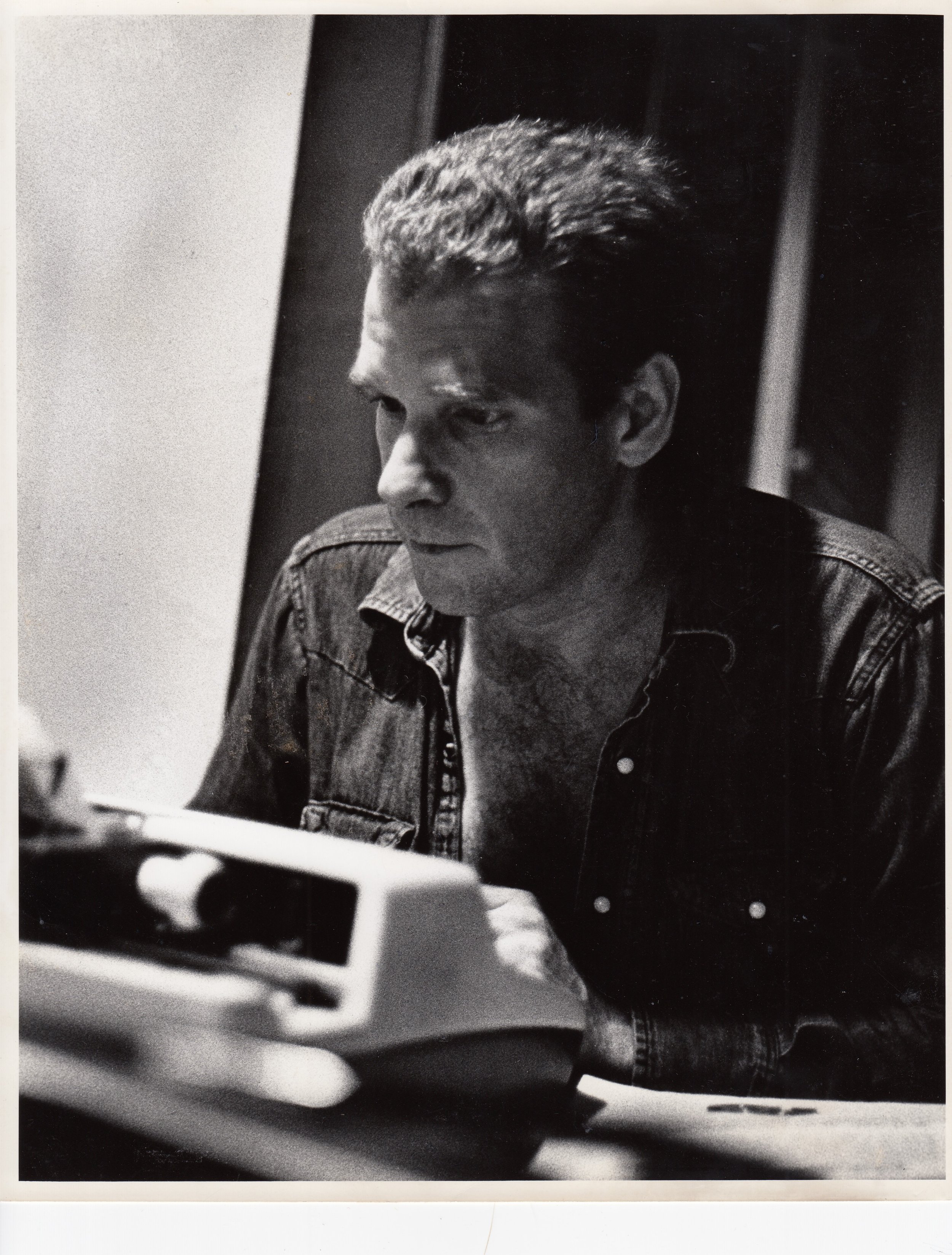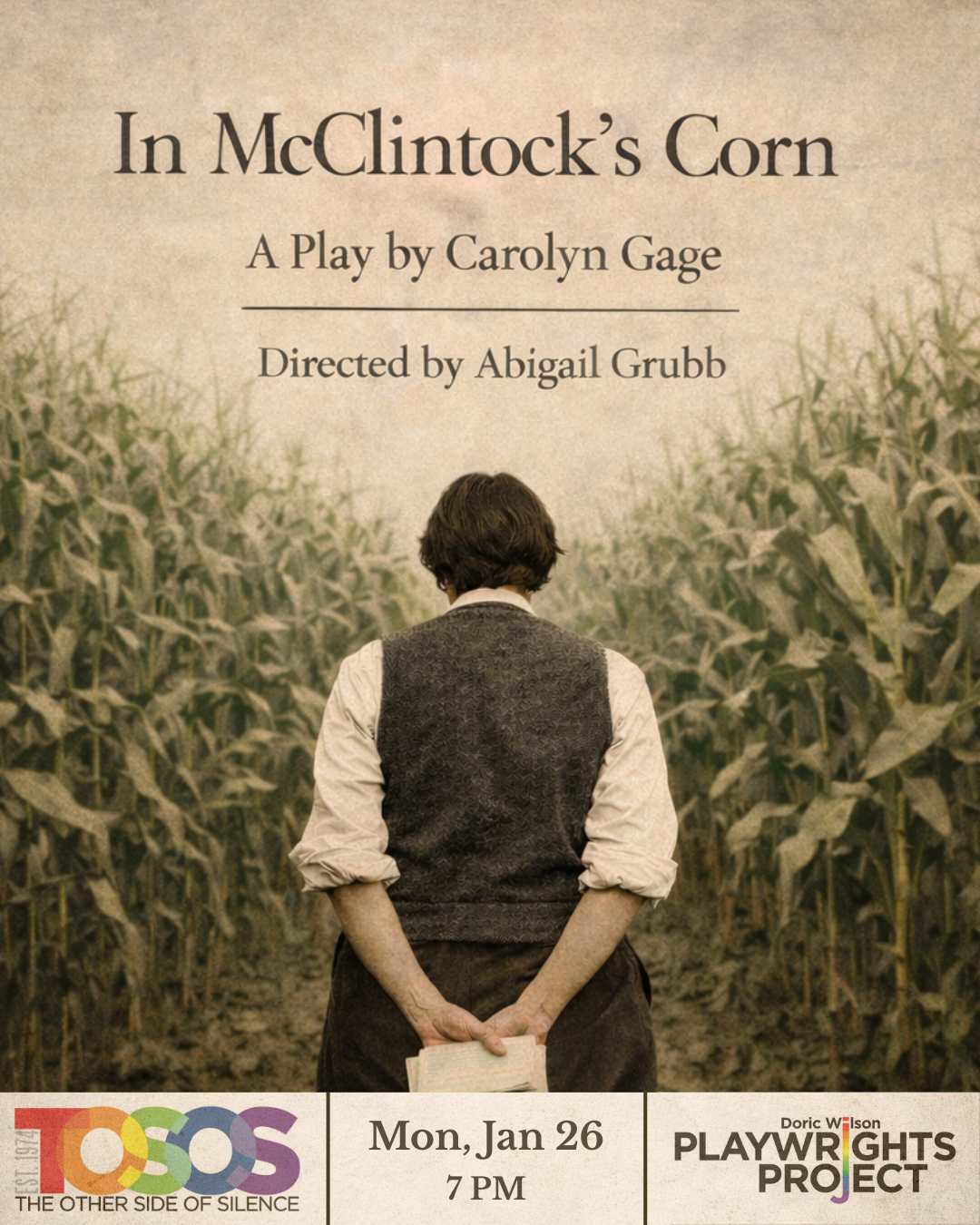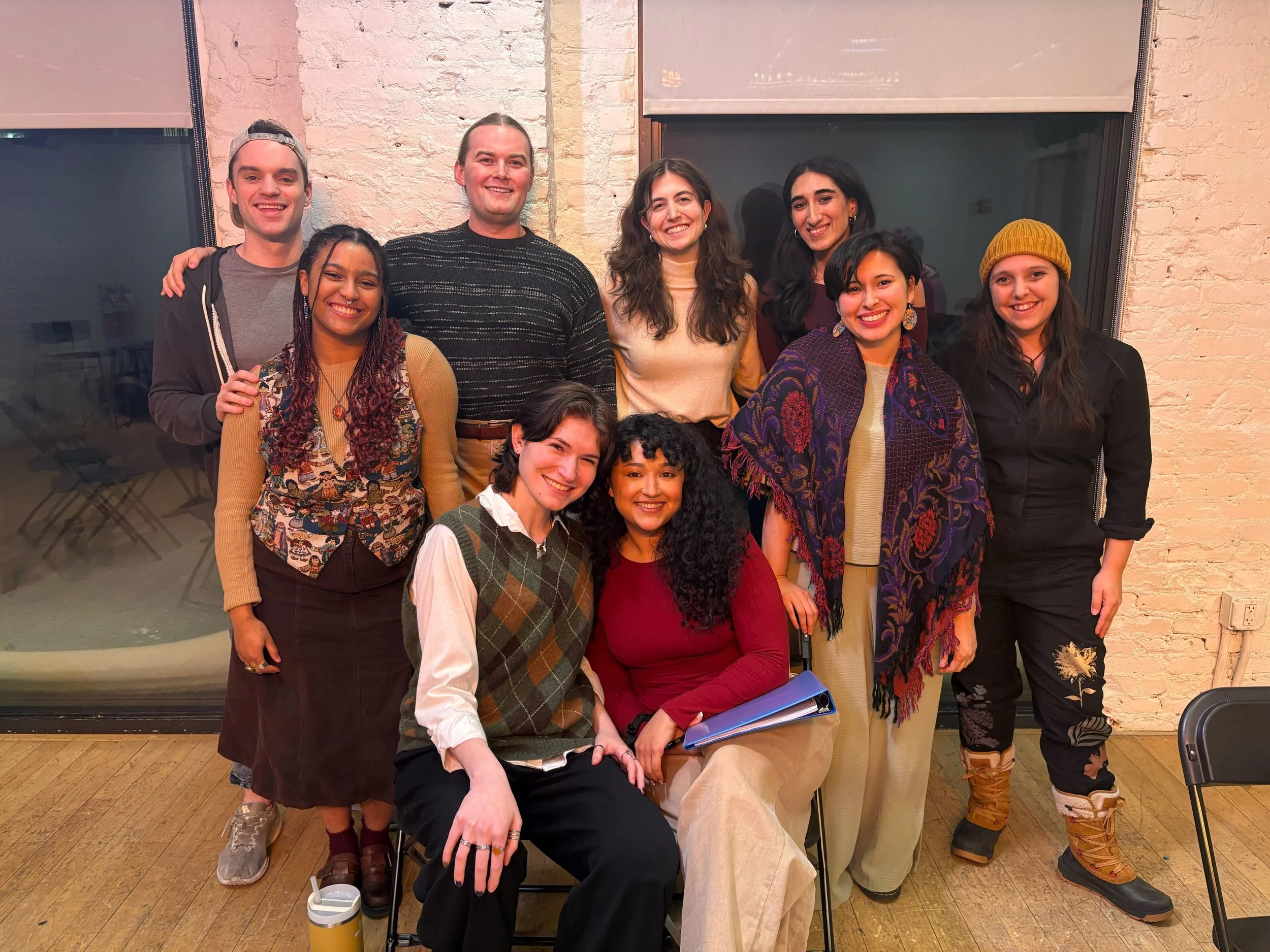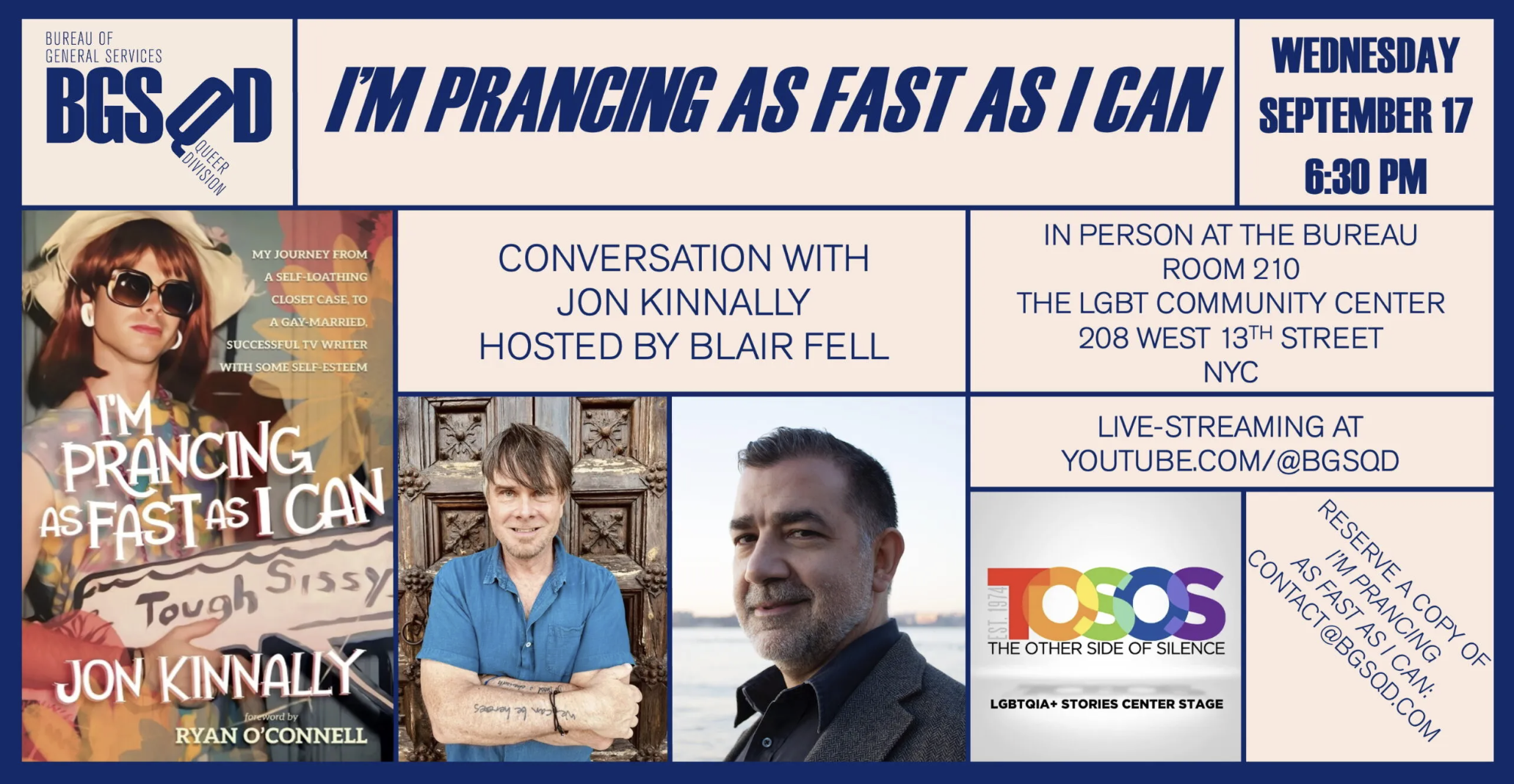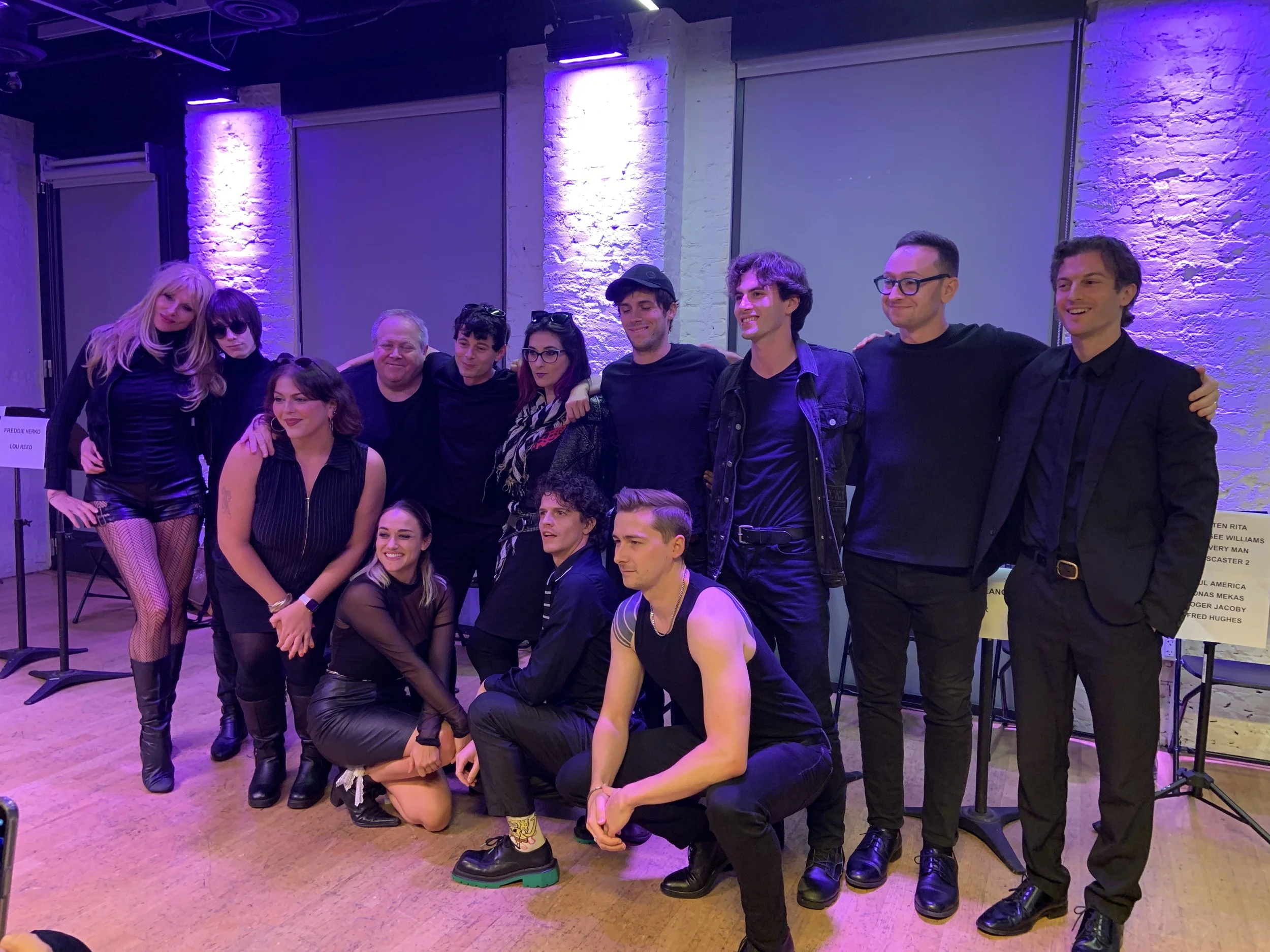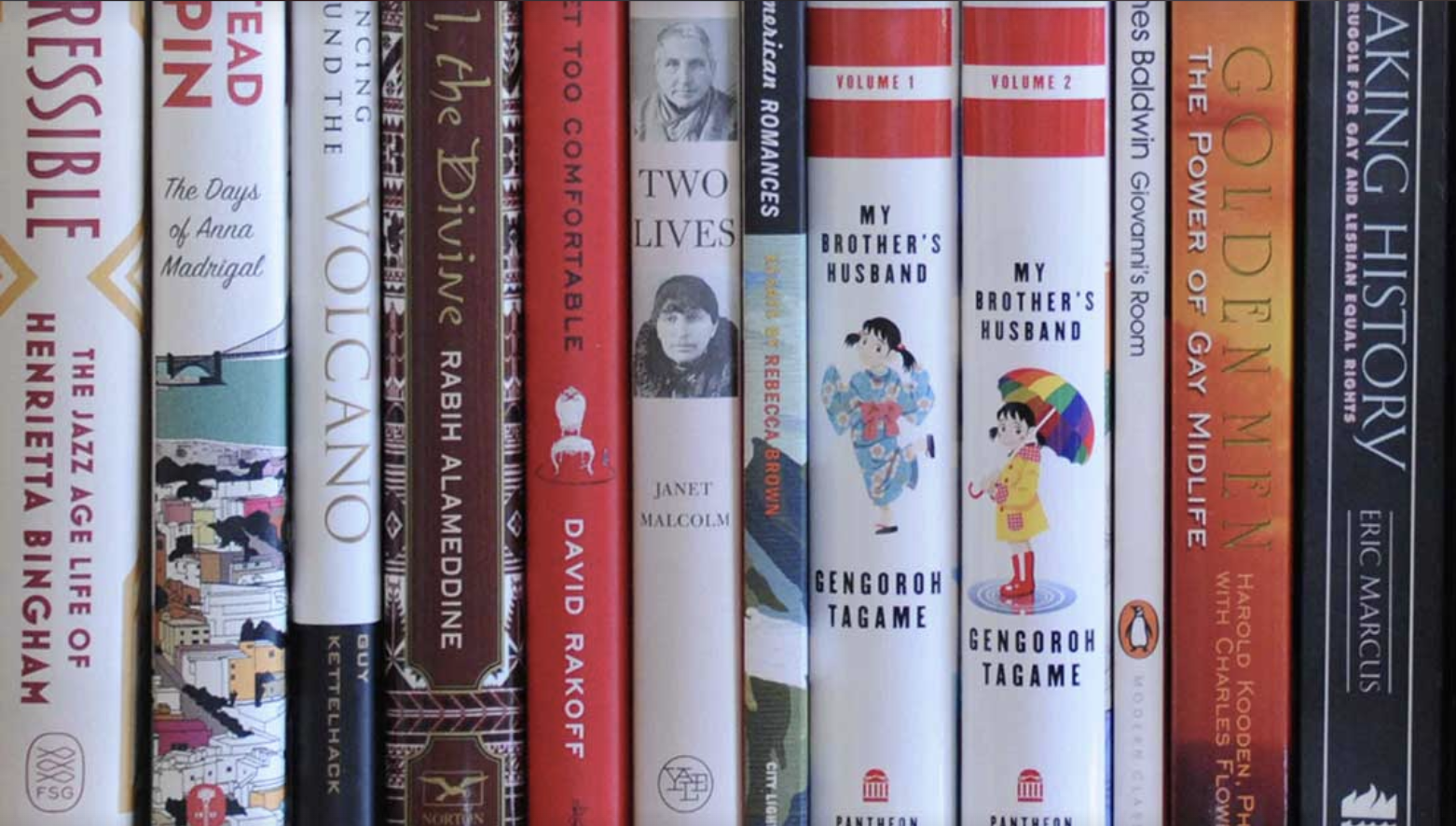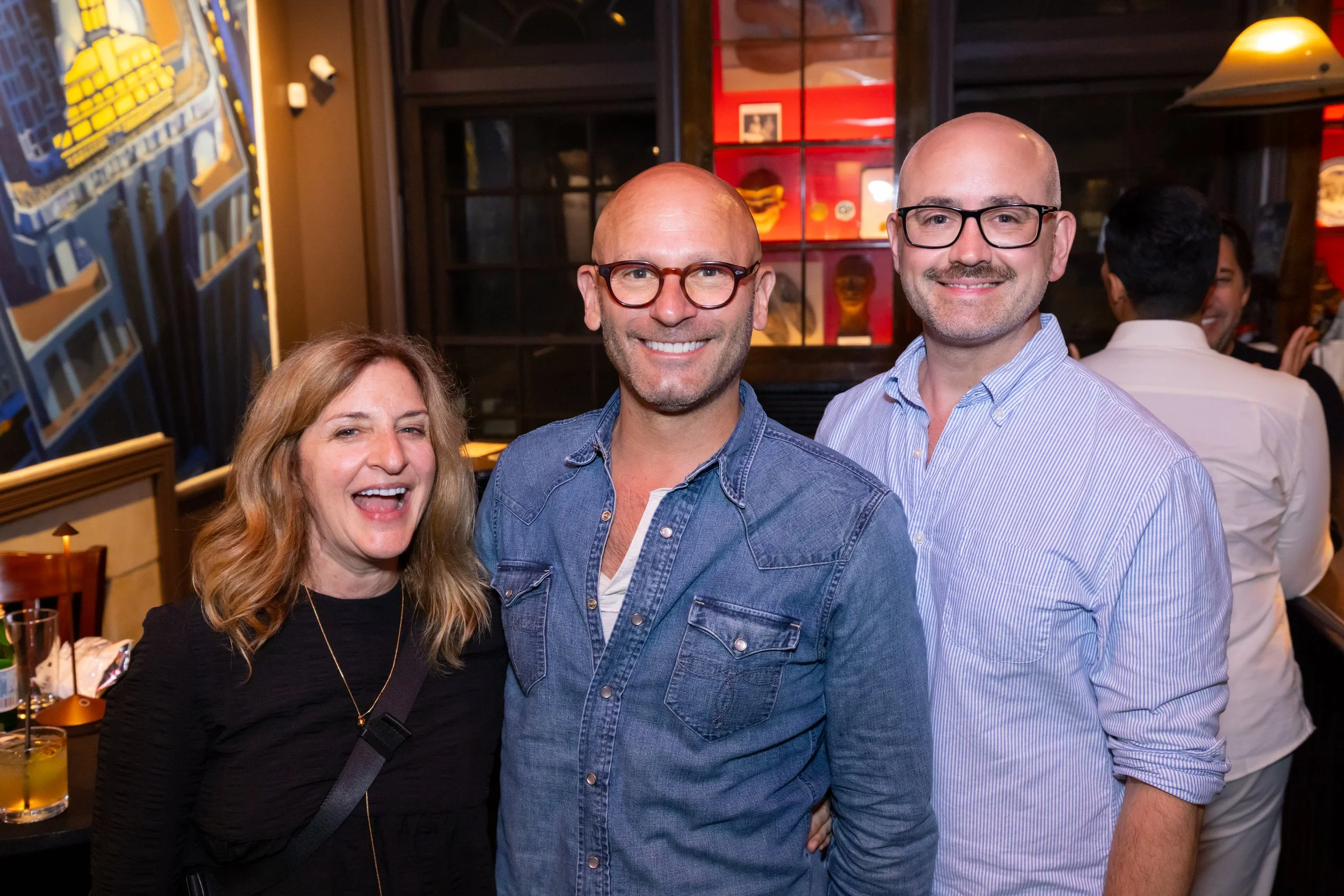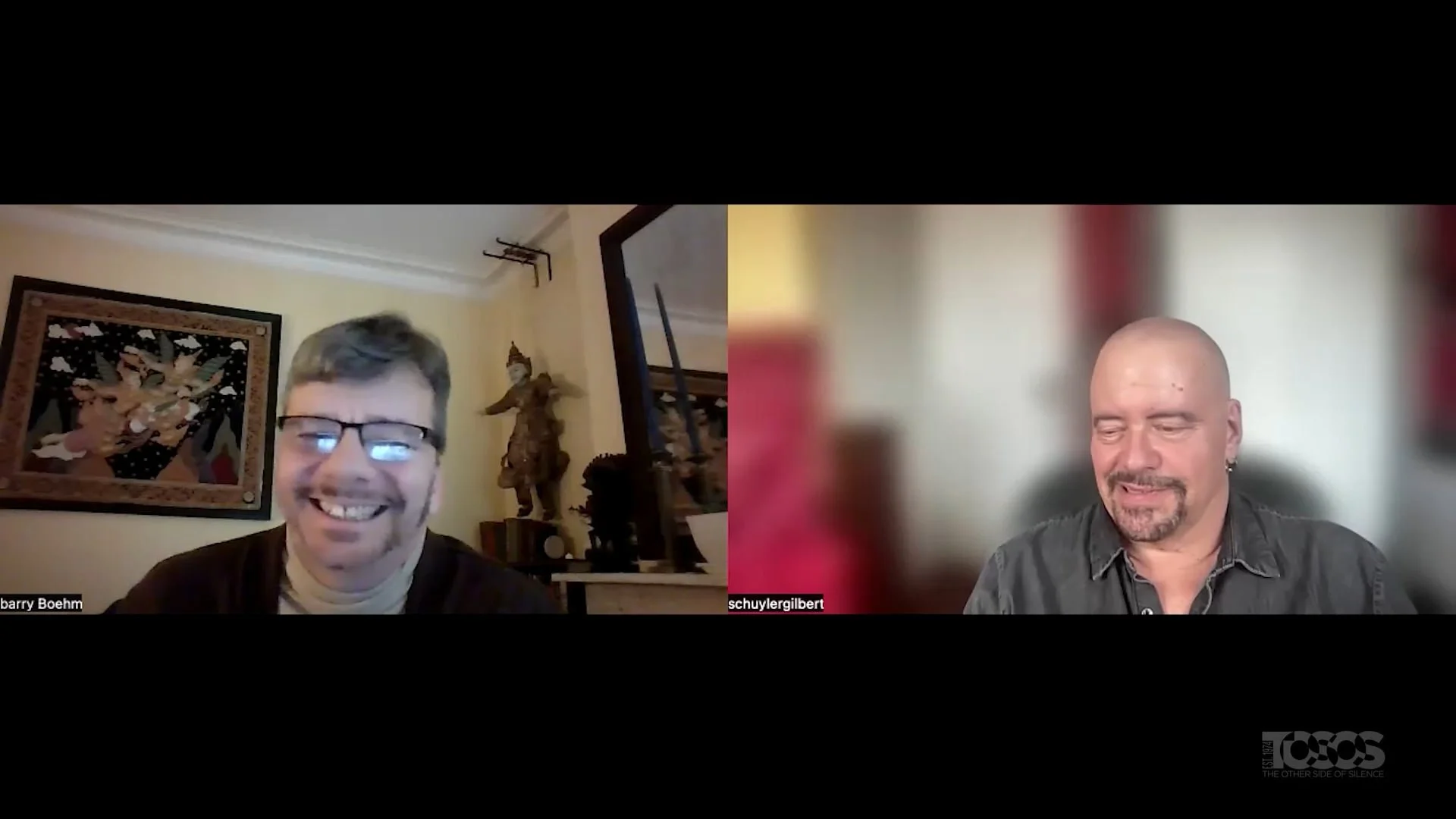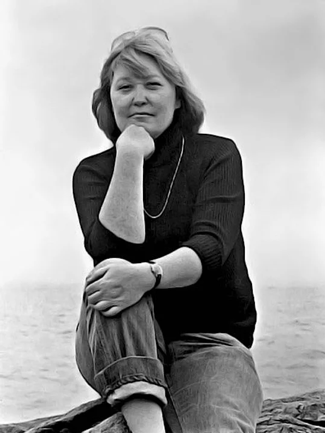next up:
TOSOS Founder and Playwright Doric Wilson
Doric Wilson at his typewriter
DORIC WILSON
PLAYWRIGHTS PROJECT
The Doric Wilson Playwrights Project is a forum for playwrights to have their work presented to an invited audience. The series celebrates writers from throughout the LGBTQ+ theatrical timeline, presenting works from past generations of playwrights alongside writers of today. All readings in the series are free to the public.
The series was established by—and now honors—one of the original founders of TOSOS and the driver of its revival in 2002, playwright Doric Wilson. Along with co-founders actor Billy Blackwell and writer/director Peter dell Valle, Doric created NYC’s first professional gay theatre company in 1974. While prolific during its run, the company closed in 1977 but the artists continued working with other producers and in new venues. 25 years later, Doric, the sole surviving founding member, revived TOSOS, along with Artistic Director Mark Finley and Managing Director Barry Childs, and established the Playwrights Project as one the company’s core programs.
CALLING ALL WRITERS!
As an LGBTQIA+ theater company, we value the diversity of artistic, cultural and life perspectives our artists bring to our stages. As storytellers, we champion the voices that aren’t being heard.
We welcome your submissions of plays and musicals, short or long, to be considered for our play reading series and main-stage productions.
Let your voice be heard! We can’t wait to get to know you!
2026 READING SERIES
The Doric Wilson Playwrights Project is curated by Dennis Corsi & Rula Muñoz.
Play, poetry and book readings throughout the year
bring our community together.
JANUARY 2026
In McClintock's Corn
By Carolyn Gage
Directed by Abigail Grubb
This play is about gender-non-conforming, neurodivergent geneticist Barbara McClintock and her companion/partner Harriet Creighton, and McClintock’s revolutionary quest
to understand diversity in nature and to reframe “deviance” as an expression of natural variance.
Cast of In McClintock’s Corn by Carolyn Gage
2025 READING SERIES
OCTOBER 2025
QUEER SPOOKY SHORTS
PLAYS
Don't Fuck With The Dead!
by Peter Boruchowitz
The Alexa App
by Joe Godfrey
The Grave
by Nay Harris
Harm To Table
by Joe Moe
The Third Bite
by Duncan Pflaster
The plays were directed by Peter Boruchowitz and Rula A. Muñoz.
SEPTEMBER 2025
I’m Prancing As Fast As I Can
By Jon Kinnally
A conversation with TV Writer Jon Kinnally (Will & Grace, Ugly Betty)
Hosted by novelist/playwright Blair Fell at Bureau of General Services: Queer Division at NYC’s LGBT Community Center
I’m Prancing As Fast As I Can is a coming of Gay story that takes us from a scared, self-hating kid who spends most of his time under his desk staring at the hunky man on the Doan’s Pills box, to becoming a writer on Will & Grace helping to make it a little easier for other scared, self-hating kids who might also be hiding and staring at their secret desire.
AUGUST 2025
HIGH PRIEST
By Paul Iacono
Directed by Rachel Klein
HIGH PRIEST tells the wild, untold story of Warhol Superstar Ondine (Robert Olivo)—a brilliant, gay performance artist and self-proclaimed “Pope of the amphetamine people”—charting his rise and fall inside Andy Warhol’s 1960s Silver Factory, only to discover the true cost of superstardom. Featuring an iconic ensemble of Factory Superstars—Edie Sedgwick, Billy Name, Gerard Malanga, Brigid Polk, Paul Morrissey, Lou Reed, Nico, and more—HIGH PRIEST is a kaleidoscopic journey through the glamour, chaos, heartbreak, and myth-making of the Silver Sixties and beyond.
High Priest by Paul Iacono — Cast & Creative Team [Photo by Chris Andersson]
BACK: Rob Byrnes (East Midtown BID), Eduardo Martinez-Leyva, Sean Patrick Mulroy, Thomas March, David Groff, Daniel Meltz, Mark Finley (TOSOS). FRONT: Scott Hightower, Carol Rosenfeld (Publishing Triangle), Gabriella Belfiglio, Arabelle Liepold (Society of Illustrators), Chris Andersson (TOSOS). [Photo by Andres Otero]
JULY 2025
Pride in Verse:
An Evening of Queer Poetry
East Midtown Pride '25 is not over! On the evening of Thursday, July 31, we'll be teaming with The Other Side of Silence (TOSOS), the city's oldest LGBTQ+ theater company; The Publishing Triangle, which has been supporting queer publishing and writers for more than 35 years; and our friends at the Society of Illustrators to present "Pride in Verse: An Evening of Queer Poetry." This free event will take place at the Society's museum at 128 East 63rd Street, so plan to join us. Participating poets include:
Photos by Andres Otero
MAY 2025
theaterlife
by SKY GILBERT
Directed by TOM ROWAN
TheatreLife by Sky Gilbert dives into the intricate, provocative dynamics of a theatrical troupe gathered under the roof of their enigmatic director. A talented young actor whose youthful charm captures the director's fascination sets off tensions within the cast. As rehearsals blend with the reality of their intertwined lives, the play explores themes of truth, illusion, and mortality, culminating in a performance where art mirrors life in unexpected ways. Gilbert offers a witty yet piercing look at the vulnerabilities behind theatrical masks and the profound cost—and thrill—of living authentically.
Barry Boehm’s interview with playwright Sky Gilbert
MARCH 2025
down cellar
by jordan elizabeth bird
Directed by DENNIS CORSI
Expecting a romantic weekend away, Jax and her professor-with-benefits, Margot, find themselves stranded at the family hunting cabin as a sudden and intense storm descends. With the unexpected arrival of Jax's parents, Jack and Gloria (and someone... else?...), the would-be couple are just trying to make it through the night unscathed. But when strange things begin happening, everyone starts asking the same questions: Am I safe here? And who's the biggest threat?
FEBRUARY 2025
IN EARNEST
by Dante Zagros Gonzalez
Directed by Sirena Lopez and Jacob Bergman
A serious sex comedy for trivial queers dedicated to Oscar Wilde, our Queen queen, featuring transgenderism, disguise, and sex.
2024 READING SERIES
OCTOBER 2024
QUEER SPOOKY SHORTS
chosen from submissions
Phase by Scott Mullen
Bowie by Barry Boehm
Southies by Jeffrey James Keyes
Practice by Caitland Winsett
Land of 1000 Smiles by Joe Moe
DIRECTORS
Andrew Coopman
Cat Gillespie
Rula A. Muñoz
AUGUST 2024
BURNING LEAVES
by TOM ROWAN
Directed by GRAYDON GUND
In need of a fresh start, Matt Leland, a young actor on the run from New York, takes a job teaching at a small high school in the Midwest—where he finds himself feeling unprepared for the unexpected challenges that await. His most talented student is Jesse Wade, a troubled sixteen-year-old on the verge of coming out. Isolated in the small conservative town, Jesse desperately needs a gay role model—and other things Matt may or may not be able to provide. Burning Leaves is a humorous, compassionate play that asks serious questions about education, friendship, and love.
History of the Playwrights Project
Originally named by founder Doric Wilson as “The Robert Chesley/Jane Chambers Playwrights Project” in 2002, the reading series was created as a forum for playwrights to have their work presented to an invited audience and has always been free to attend.
The series honored Jane Chambers (1937-83) and Robert Chesley (1943-90) – arguably two of the most original and impassioned voices to contribute to our theatrical heritage.
You will find below a list of playwrights whose work has been presented in the series, as well as bios of the original honorees.
Past Chesley/Chambers readings
Swan Adamson — The Dads Try to Get Married (2010)
Kathy Anderson — Incoming (2008)
Virginia Baeta — Damaged Goods (2015)
Leslie Bramm — The Minute Man (2013)
J.Stephen Brantley — The Jamb, Billy Baal (2015)
Kevin Brofsky — Dancing Straight, Tops and Bottoms (2004), Hurricane Damage (2015), N’dom (2017)
Victor Bumbalo — Questa (2006)
Jane Chambers — My Blue Heaven (2013)
Robert Chesley — Stray Dog Story (2013)
Meryl Cohn — Almost Home, And Sophie Comes Too (2008) & Insatiable Hunger
Constance Congdon — Dog Opera (2005)
Josh Conkel — I Wanna Destroy You
Fiona Coyne — Careful
Bob Cruz — Schadenfreude! (2003) & The Writers Block (2003)
Emma Donoghue — I Know My Own Heart (2008)
Linda Eisenstein — That Was No Lady from the Sea! (2004) & Zombie Grrrlz from the Crypt (2004)
Steven Fales — Missionary Position (2008) & Who’s Your Daddy?
Lisa Ferber — Penny’s One Date (2005)
Mark Finley — Christmas Moon, The Chiselers (2008), Forever Under (2008), How Do We Get Her in the Water? & The Mermaid (2003)
The Five Lesbian Brothers — The Secretaries
Kevin R. Free — Balboa is not Drowning (2018)
Carolyn Gage — The Countess and the Lesbians (2008)
Joe Godfrey — Winter Cruise
Jewelle Gomez — Waiting for Giovanni (2013)
Donnetta Lavinia Grays — The B Factor & The Review: Or How to Eat Your Enemy
Barbara Kahn — The Lady was a Gentleman (2018)
Georgette Kelley — Ballast (2015)
Byron Loyd – Dixie Boy Fireworks
Charles Ludlam — Caprice
Hector Lugo — La Tosca…!
Jimmy Maize — In One Room (2004)
Brian Merriman – Eirebrushed & Wretched Little Brat
L. Jay Meyer — Minor Victories (2004)
Tim Mullaney — What to Say (Glass Houses) (2004)
Merril Mushroom – Bar Dykes (2018)
Nick Mwaluko — Waafrika (2005)
Bob Ost — Breeders (2008)
David Parr — Slap & Tickle
Nicholas A. Patricca — Oh, Holy Allen Ginsberg … (2008)
Robert Patrick — Hollywood at Sunset (2003), The Haunted Host & Sound (2008), Untold Decades
Duncan Pflaster – Light and Noice and Bees and Boys
Felice Picano — The Bombay Trunk (2003)
Robbie Robertson — Revival (2014), Satan in High Heels (2013)
Garet Scott — Roll with the Punches (2003)
Martin Sherman – Bent
Alisha Silver — Golden (2008)
Bill Solly and Mark Finley — A Night at Danny Larue’s (2018)
Daniel Talbott — Slipping (2009)
Ron Tavel — Kitchenette (2005)
Vanda — Screaming in the Wilderness (2004)
Bruce Ward — Fabulous Ride into the Unknown (2003)
Kathleen Warnock — The Audience/Rock the Line (2005), Outlook & The Further Adventures of…(2014)
Chris Weikel — Making it up as We Go Along, (2004) Speaking Parts, Dansport (2004), Pig Tale, an Urban Faerie Story (2008), Provenance & Secret Identity, Penny Penniworth, Gareth and Lynette, Nelly (2015)
Tennessee Williams — Clothes for a Summer Hotel (2005) and The Parade or Approaching the End of a Summer
Doric Wilson — The Boy Next Door, Forever After, Now She Dances! (2004) & The West Street Gang
Lanford Wilson — Say DeKooning
HONORED PLAYWRIGHTS' BIOS
JANE CHAMBERS
From Dr. Sara Warner’s Afterword to Lesbian & Queer Plays from the Jane Chambers Prize, edited by Maya Roth and Jennifer-Scott Mobley (NoPassport Press, 2019):
Jane Chambers was in rehearsals for Kudzu at Playwrights Horizons in 1981 when she became ill with what would be diagnosed as a brain tumor. The cancer proved to be as malignant as the invasive vine for which the play is named. Chambers lost the ability to write and couldn’t complete the revisions for Kudzu, which had been optioned for a Broadway run. The producer backed out, and Chambers never made it to the Great White Way. She would have been the first lesbian to stage a play about lesbians – happy, well-adjusted lesbians – on Broadway. Audiences would have to wait decades for alternatives to those “god-damned sick and dirty” women whose love for other women resulted in their condemnation (The God of Vengeance), suicide (The Children’s Hour), or homicidal urges (The Killing of Sister George). Nuanced and complex lesbian characters began to appear on Broadway (often as minor players, typically in musicals) in the late 1990s (e.g., Falsettos, Rent, The Color Purple), but it wasn’t until 2006 that a lesbian-themed work by a lesbian creator, Lisa Kron’s Well, achieved what Chambers was poised to do in the 1980s.
One of the most important dramatists of the twentieth century, Chambers’ reputation rests largely on “the lesbian plays” she wrote during the 1970s, though these constitute only a fraction of her astonishing creative output. In her brief life – she died one month shy of her forty-sixth birthday – Chambers wrote at least thirty-five plays, seventeen novels (two of which were published), thirty-two screenplays and television scripts, thirteen short stories, one poetry collection, and dozens of articles. Chambers’ luck changed radically in 1980 when John Glines invited her to stage Last Summer at Bluefish Cove (1974) as part of the First Gay American Arts Festival in New York. A resounding success, the festival run at the West Side Mainstage Theatre was extended, followed by a transfer to the Actors Playhouse in Greenwich Village. The play received a Villager Downtown Theatre Award, and a California production garnered the Los Angeles Drama Critics Circle Award (1983).
Chambers headlined the second Gay American Theatre Festival with My Blue Heaven (1981), her most idealized portrait of a lesbian relationship, and one of the earliest examples of a same-sex wedding in American drama. Her Tales of the Revolution and Other American Fables (1969), a bracing exploration of the sexism, homophobia, and racism of contemporary society, earned her a fellowship to the O’Neill Playwriting Center in 1972. That same year, Chambers was elected Chairperson of the New Jersey Women's Political Caucus (agitating alongside Bella Abzug and Gloria Steinem) and co-founded Women’s Interart Theatre. In 1982, Chambers made her last public appearance when she received the Fund for Human Dignity Award and her legacy lives on in the Women and Theatre Program’s annual Jane Chambers Playwriting Award, founded in 1983.
ROBERT CHESLEY
From the Robert Chesley/Victor Bumbalo Foundation website:
After receiving his B.A. in Music from Reed College in Portland, Oregon in 1965, Robert Chesley spent ten years teaching private school in upstate New York. From 1965-75, Chesley composed the music to over five dozen songs and choral works, chiefly to texts by poets such as Emily Dickinson, Willa Cather, James Agee, Walter de la Mare, Gertrude Stein and Walt Whitman. In 1976, he came out as a gay teacher and moved to New York City. During the next few years, his essays and theater criticism appeared in Gay Community News, The Advocate, Gaysweek, The San Francisco Review of Books, The Bay Guardian and The New York Native.
Chesley began writing for gay theater in 1980 and his first play, a one-act titled Hell, I Love You, was produced by Theatre Rhinoceros in San Francisco. Productions of his subsequent plays followed in San Francisco, New York City and Los Angeles, as well as in other U.S. cities and Toronto and London. Night Sweat became the first produced full-length play to deal with the AIDS crisis, when staged by Meridian Gay Theatre in New York City in 1984. Jerker or the Helping Hand had its premiere at the Celebration Theatre in Los Angeles in 1986. A subsequent radio broadcast by KPFK-Los Angeles of excerpts from the play prompted the Federal Communications Commission to attempt broadcast censorship for the first time since 1975. Jerker has since become his most performed play.
Robert Chesley leaves a literary legacy of 10 full-length plays and 21 one-acts, as well as short stories, novels, an opera libretto, and the text for a dance-theater piece. The catalogue of his music lists more than 60 works composed between 1964 and 1976, and includes songs for solo voice, choral pieces and instrumental works. He was a member of the Dramatists Guild and the Society of Gay and Lesbian Composers.



